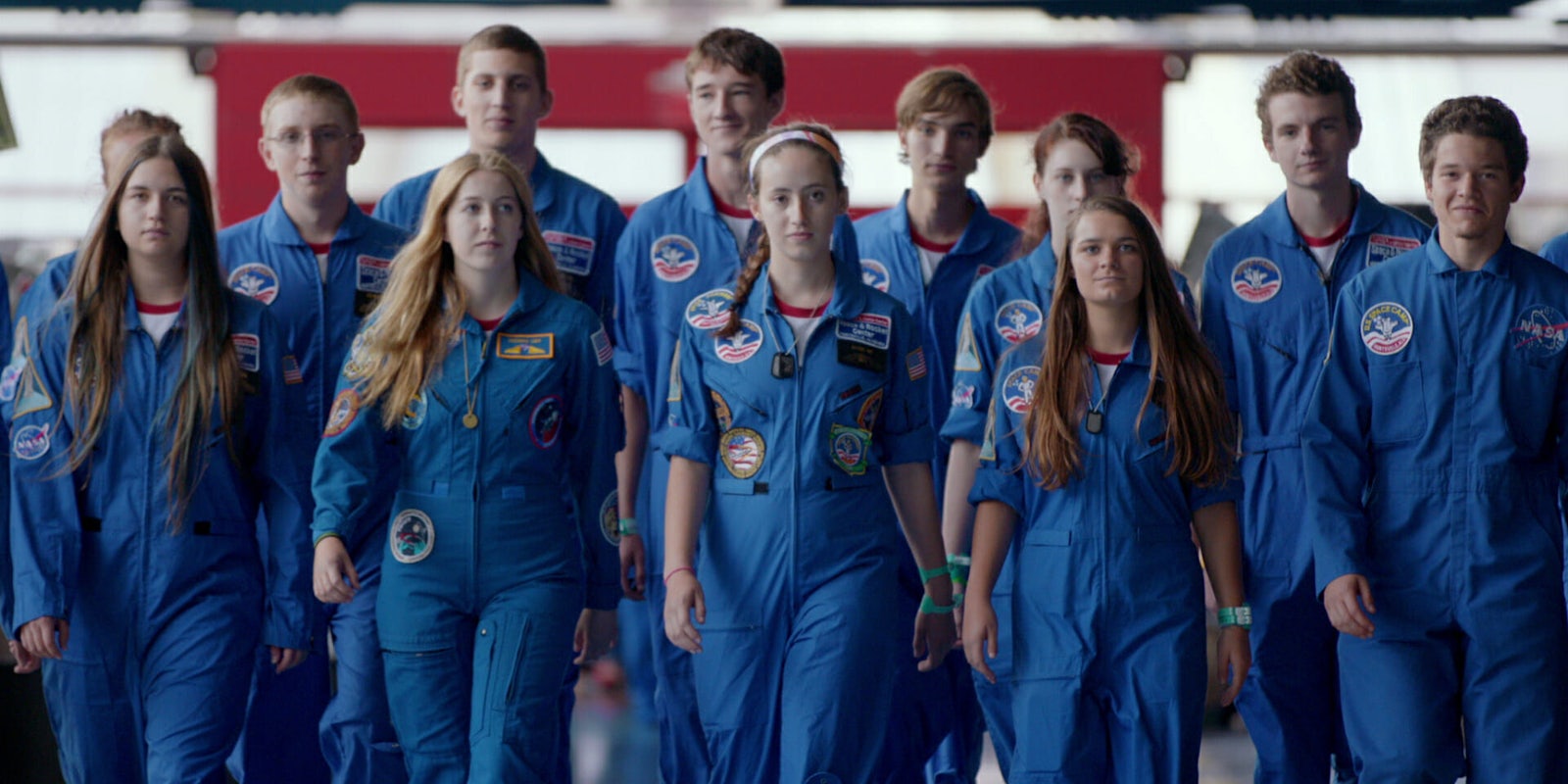Netflix’s new space documentary introduces us to several bespeckled, bright-eyed teens who identify as “the Mars generation.” They are perceptive and smart, priding themselves on being labeled “space nerds.” It’s all very endearing, without becoming saccharine. But there is wistful feeling of melancholy here, given how every recent generation also believed it was, in spirit, the Mars generation. So what separates this crop of dreamers?
The fact that we are closer than we’ve ever been to Mars, for starters. Even if NASA is no longer funded as it was during the Space Race that started in 1957—4 percent of government funding went to NASA in the 1960s, compared to the 0.04 percent that is being allocated today—under President Barack Obama, it was estimated we would reach Mars sometime in the 2030s.
As director Michael Barnett’s documentary explores, times are changing. President Donald Trump is very unlikely to expand governmental spending and resources to Mars programs. While he did sign a new bill in March allocating $19.5 billion to NASA, Space X CEO Elon Musk slammed it, saying that this “bill changes almost nothing about what NASA is doing. Existing programs stay in place and there is no added funding for Mars.”
The real hope for the future of space travel, the documentary posits, lies in companies like Boeing and SpaceX, as well as the young pioneers of today. As darkly stark as current events may seem, there is something hopeful about watching 14-year-olds—some of whom are ostracized by their peers in school—bond over a shared love of science and space.
Watching these kids literally go bug-eyed over the test of small, man-made rockets with an “eggonaut” as payload simply inspires. Their love of all things space is infectious, even if it is clouded by an undercurrent of trepidation.
The documentary features interviews from people who are space and science rock stars: Neil deGrasse Tyson, Bill Nye, Michio Kaku, and many more. They warn that if we impede progress, our lofty goals will become further out of reach, citing the change from President John F. Kennedy’s doctrine in the early 1960s to President Richard Nixon’s doctrine as an example.
Kennedy was famous for pushing forward in the space race. The documentary follows familiar trajectory by examining the history of the space race. After Kennedy’s assassination and the rise of the Vietnam War, Nixon’s policies focused less on reaching for the stars and more on centering those new technologies homeward. The doc hints at a parallel between Kennedy/Obama and Nixon/Trump.
Even if Obama didn’t exactly forward advancements in space exploration and funding, he encouraged private agencies to find cheaper, more accessible ways of sending spacecrafts into Earth’s orbit. As the documentary argues, under Kennedy’s leadership goals were set. He wanted to reach the moon in 10 years, and despite the extreme hardships that occurred, it happened. If the government had followed engineer Wernher von Braun’s plan from the late 1960s, the doc argues we could have reached Mars by sometime in the 1980s.
The doc also outlines the logistics that have derailed our trips to space. A reason for those challenges is the development of the space shuttle. While it was revolutionary and game-changing for spacecraft evolution at the time, NASA wasn’t able to utilize its potential. At most it would venture “around the block and back,” as Tyson intones. When it was retired in 2011 with the Space Shuttle Atlantis, Tyson explains it was disappointing because unlike the Apollo missions, no new spacecraft was waiting in the warehouse. As Tyson wistfully recalls, “the launching pad was empty.”
It is why, as the doc explores, NASA is no longer leading the pack when it comes to innovation. The doc argues that in order to reach Mars in the timetable Obama set out, the objective needs more than just hopeful kids. It needs funding, practical resources, and a government that will support programs that advance research and development, and not impede them.
The doc doesn’t let you forget the importance of this Mars generation, however. Besides the history lesson and the testimonials from space experts, the core of the documentary rests in the hearts and brains of these young, cheerful space nerds. The doc even goes further to argue that because of people like SpaceX frontiersman Musk and eccentric billionaire Richard Branson, the seemingly impossible goal of colonizing and inhabiting Mars is achievable now more than ever.
What separates this ‘Mars generation’ more than any past generation is the willingness and resourcefulness of young, bright minds to consistently leap forward, despite whatever obstacles may try to keep them on Earth.


